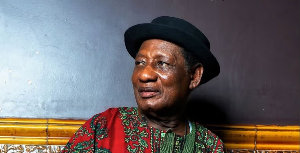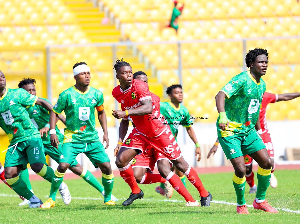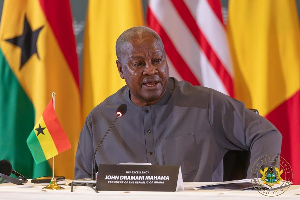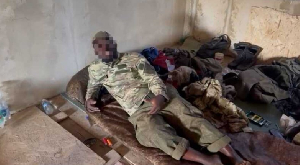By Dr. Michael J.K. Bokor
E-mail: mjbokor@yahoo.com
August 22, 2010
As if under a spell to do the wrong thing again and embarrass the government, the Attorney General and Minister of Justice, Mrs. Betty Mould Iddrisu, has filed an appeal seeking to overturn the High Court ruling that freed the two principal organizers of Ghana's 50th independence anniversary celebrations, Kwadwo Mpiani and Wereko-Brobbey. Whether she is convinced that “a Daniel will come to judgement” this time to grant her wish, no one knows. But I can stick my neck out to say that she is hell-bent on losing another aspect of this case, which has drawn unprecedented interest from Ghanaians.
The matter is still “sub judice” (which precludes any open comment on it), but I can’t restrain myself. The A-G has taken a line of action that must not be glossed over because it has the potential to further strain relationships and mock the circumstances surrounding this case. I am wary of the repercussions, especially with the filing of this appeal when it appears that the case has already attracted much public interest and pitted the government (and its political party, the NDC) against the Judiciary and its opponents. It seems to be dragging everyone else into a scary wordy warfare whose impact on our politics is anything but welcome. The battle lines are clear. Our democracy stands to lose if political pressure becomes the tool with which to fight for justice at the courts. It seems the Judiciary is being forced to bend backwards against laid-down legalities.
The A-G is at the center of this imbroglio—having lost the case in the first round and is now trotting into the boxing ring with little preparation but a political clout under her sleeves. Although we don’t know exactly what the grounds of the appeal may be, we can tell that the appeal is already fraught with technical problems and is destined to fail. It is a non-starter. Here is why I think that the A-G’s Department doesn’t seem to have good grounds for initiating this appeal process, especially all too soon:
The Director of Public Prosecutions, Gertrude Aikins, said it was a bit premature for the trial judge to conclude that the prosecution was going to rely on the evidence gathered at the Justice Douse Commission hearing and thereby proceed to strike out the case.
Therein lies the problem. We can see fault lines already because the appeal seems not to have been wrought out of the technicalities on which Justice Marful-Sau based his ruling when he struck out the case against Wereko-Brobbey and Mpiani. The A-G doesn’t seem to be addressing the very technicalities that torpedoed her case in the first round. These technicalities are difficult to circumvent and I wonder how much the A-G has done to warrant this appeal. The three main technicalities that I gathered from the ruling are the following:
1. IMMUNITY FOR WITNESSES
The terms of reference under which the Justice Duose Commission handled the matter don’t permit the trial of those appearing before the Commission (to give evidence) as witnesses. Implication? Wereko-Brobbey and Mpiani appeared as such and should be deemed as exempted from prosecution. The relevant provision (Article 8(2)) reads: “A person shall not be subject to any civil or criminal proceedings under any enactment by reason of that person's compliance with a requirement of the Commission.”
This immunity is sacrosanct and will be difficult to side-step. Justice Marful-Sau’s opinion is that the action to prosecute the two amounted to a violation of the Constitutional Instrument (CI61) which gave birth to the Commission that probed the Ghana@50 celebrations. It is just like subverting the Transitional Provisions (Indemnity Clause) in the 1992 Constitution to drag JJ Rawlings or any other person so indemnified for their acts of omission or commission in the period covered by the Transitional Provisions. It won’t cut butter!
This fundamental problem in the Constitutional Instrument 61 that empowered the Justice Duose Commission is a major technical glitch which will not be easily contested and thrown aside for the benefit of the A-G. More importantly, the harm it has done cannot be undone. Can this immunity be nullified long after the Commission has completed its work and government has come out with a white paper on its findings? Anything that attempts to reverse it will present a monumental precedent to our jurisprudence. I don’t think that the government and the A-G are prepared for its consequences.
2. CONTROVERY SUROUNDING FINDINGS OF COMMISSIONS OF INQUIRY
Justice Marful-Sau struck out the case and granted the reprieves sought by Wereko-Brobbey and Mpiani on another ground—findings of Commissions of Inquiry shouldn’t automatically or necessarily become the substance or basis for prosecuting people. He tore through the various instances and averred that although some legal actions had been taken on such findings in the past, he did not think that such a line of action should be sustained. This aspect is also challenging and not answered by this explanation by the Director of Public Prosecutions:
“You know something, in prosecutions, you file a charge [but] that doesn’t mean that that is the charge you are going to go on. You are free to amend, to add to it, to subtract from it…before the case starts. We only filed one charge sheet; we hadn’t even settled when this matter came.”
She said the prosecution was not going to rely on the evidence garnered at the Commission hearings.
“This is a criminal prosecution, we are not using the evidence that was given there because that was an enquiry, nobody was on trial there,… What happened there was an enquiry, they were trying to get facts, now we are going to prosecute. This is a trial, what we are trying to do is to try [them], we are not going to use their [testimonies] against them, we have to find other evidence,” she explained.
She seems to have missed the point altogether. The technicality is not about the source or the evidence but about the legality or otherwise of prosecution based on the findings of a Commission of Inquiry. Justice Marful-Sau’s opinion erodes any basis for the opinion held by the A-G’s Department. He is questioning an issue that has been taken for granted all this while. Not until the A-G can debunk this opinion, any appeal stands no chance on this score.
It appears that something else must be driving this appeal. A word of caution: In handling sensitive court cases of this sort, the focus shouldn’t be on winning at all costs, especially if fundamental problems come to notice. We must use such cases to expose the weaknesses in our jurisprudence with the view to refining the judicial system to stand the test of time. As a fallible human institution or mechanism for interpreting and controlling human behaviour, the judicial system should help us solve problems, not compound them.
This technicality offers us a unique opportunity to look more deeply into the intricacies of our legal framework so as to eradicate its unworkable aspects. Insisting on getting a pound of flesh from Wereko-Brobbey and Mpiani at all costs (in the face of such legal inhibitions) will blind us to these troubling bottlenecks in our jurisprudence. I am saying that the A-G is not doing enough serious diligent work to factor Justice Marful-Sau’s opinions into the handling of this case.
3. VIOLATION OF FUNDAMENTAL HUMAN RIGHTS
Another technical hitch, which reduces the A-G’s move to absurdity, is Justice Marful-Sau’s opinion that prosecuting Wereko-Brobbey and Mpiani within the 6-month grace period granted them to appeal against the adverse findings of the Justice Duose Commission is a violation of their fundamental human rights. The constitutional provision on the fate of those against whom adverse findings are (or have been) made gives them 6 months within which to appeal against those adverse findings. In the case of Wereko-Brobbey and Mpiani, this grace period ends on October 20, 2010. The A-G’s appeal violates this provision and renders it still-born already.
I am at a loss in trying to comprehend this rashness on the part of the A-G. Unless the A-G wants to tell me that I don’t understand the language of Justice Marful-Sau’s ruling or the legal basis on which she has filed this appeal, it will be difficult to see wisdom in what she has embarked on. If for nothing at all, why not wait till the October 20, 2010 deadline elapses before taking on Wereko-Brobbey and Mpiani? In that way, the A-G would have removed a major stumbling block on the way toward pushing the two into a tight corner. Within this 6-month grace period, anything can happen.
If Wereko-Brobbey and Mpiani go ahead to file an appeal against the Justice Duose Commission’s adverse findings against them, the drama that will unfold (with the adducing of reasons for the appeal) should give the A-G more insights into how to proceed with the substantive case itself (causing financial loss to the state and the other charges). I am quite certain that any grounds exposed by Wereko-Brobbey and Mpiani will be fertile enough for the A-G to mine. Anything short of waiting for the 6-month grace period to elapse before the filing of this appeal will end abruptly (and disastrously too) with a negative boomerang effect on the A-G, the government, and the NDC.
In fact, the A-G seems to be expending energy and resources on a frightening wild goose chase, which will cause more hiccups for the government and further deepen the NDC’s woes. Why is the A-G in such an indecent hurry to kill the goose that is being nurtured to lay and hatch the State’s (or government’s) golden eggs?
Opinions of Tuesday, 24 August 2010
Columnist: Bokor, Michael J. K.
The Attorney-General says "Divided We Stand"
Entertainment













